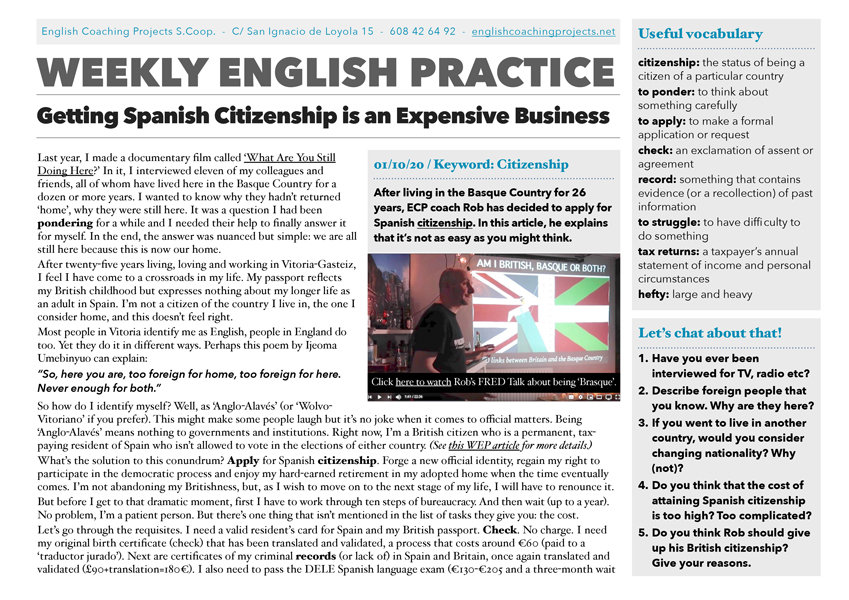Getting Spanish Citizenship is an Expensive Business
01/10/20 / Keyword: Citizenship
After living in the Basque Country for 26 years, ECP coach Rob has decided to apply for Spanish citizenship.
Click HERE to download the Weekly English Practice as a PDF.
Useful vocabulary
Read and check you understand this vocabulary before you read and listen to the text.
citizenship: the status of being a citizen of a particular country
to ponder: to think about something carefully
to apply: to make a formal application or request
check: an exclamation of assent or agreement
record: something that contains evidence (or a recollection) of past information
to struggle: to have difficulty to do something
tax returns: a taxpayer’s annual statement of income and personal circumstances
hefty: large and heavy
Listen to the audio (refresh the page if it’s not visible) and read the text.
After living in the Basque Country for 26 years, ECP coach Rob has decided to apply for Spanish citizenship. In this article, he explains that it’s not as easy as you might think.
Last year I made a documentary film called ‘What Are You Still Doing Here?’ In it, I interviewed eleven of my colleagues and friends, all of whom have lived here in the Basque Country for a dozen or more years. I wanted to know why they hadn’t returned ‘home’, why they were still here. It was a question I had been pondering for a while and I needed their help to finally answer it for myself. In the end, the answer was nuanced but simple: we are all still here because this is now our home.
After twenty-five years living, loving and working in Vitoria-Gasteiz, I feel I have come to a crossroads in my life. My passport reflects my British childhood but expresses nothing about my longer life as an adult in Spain. I’m not a citizen of the country I live in, the one I consider home, and this doesn’t feel right.
Most people in Vitoria identify me as English, people in England do too. Yet they do it in different ways. Perhaps this poem by Ijeoma Umebinyuo can explain:
“So, here you are, too foreign for home, too foreign for here. Never enough for both.”
So how do I identify myself? Well, as ‘Anglo-Alavés’ (or ‘Wolvo-Vitoriano’ if you prefer). This might make some people laugh but it’s no joke when it comes to official matters. Being ‘Anglo-Alavés’ means nothing to governments and institutions. Right now, I’m a British citizen who is a permanent, tax-paying resident of Spain who isn’t allowed to vote in the elections of either country. (See this WEP article for more details.)
What’s the solution to this conundrum? Apply for Spanish citizenship. Forge a new official identity, regain my right to participate in the democratic process and enjoy my hard-earned retirement in my adopted home when the time eventually comes. I’m not abandoning my Britishness, but, as I wish to move on to the next stage of my life, I will have to renounce it.
But before I get to that dramatic moment, first I have to work through ten steps of bureaucracy. And then wait (up to a year). No problem, I’m a patient person. But there’s one thing that isn’t mentioned in the list of tasks they give you: the cost.
Let’s go through the requisites. I need a valid resident’s card for Spain and my British passport. Check. No charge. I need my original birth certificate (check) that has been translated and validated, a process that costs around €60 (paid to a ‘traductor jurado’). Next are certificates of my criminal records (or lack of) in Spain and Britain, once again translated and validated (£90+translation=180€). I also need to pass the DELE Spanish language exam (€130-€205 and a three-month wait for the result), and the CCSE Spanish constitutional and sociocultural test (€85). Finally, there are typical documents such as my proof of address and my marriage certificate. All these have to be uploaded to an online platform with the final proof of payment of the €102 administration fee. If we add all those costs up, the total is around €600. I have savings and I’m currently employed, but that is a significant amount of money and I’m sure many will struggle to find those funds.
This exaggerated cost raises a question: If the Spanish state requires me to prove I speak the language and ‘understand’ the culture, couldn’t it just look at the last twenty-six years of my tax returns? And how can an administration justify charging hundreds of euros to do obligatory exams on top of the already hefty administration fee? Oh, well. Best not complain. Not if I want Felipe to come to my ‘swearing of the constitution’ ceremony to witness me renounce his distant cousin Elizabeth!
Written by ECP coach Rob Hextall
Let’s chat about that!
- Have you ever been interviewed for TV, radio etc?
- Describe foreign people that you know. Why are they here?
- If you went to live in another country, would you consider changing nationality? Why (not)?
- Do you think that the cost of attaining Spanish citizenship is too high? Is it too complicated?
- Do you think Rob should give up his British citizenship? Give your reasons.
Take a moment to look at these related articles!
Thousands Of UK Voters Lose Right To Vote And Become Invisible!
Double Standards When Talking About Immigrants
Forget Brexit, what are the British Isles, the UK, Great Britain and Éire?

